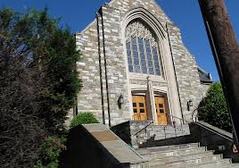|
This is a well known story, from M. Scott Peck's book, The Different Drum. I include it in this series because (a) I like it and (b) it is used so often within the context of community building. Have you ever had the occasion to use it?  The story concerns a monastery that had fallen upon hard times. Once a great order, as a result of waves of antimonastic persecution in the seventeenth and eighteenth centuries and the rise of secularism in the nineteenth, all its branch houses were lost and it had become decimated to the extent that there were only five monks left in the decaying mother house: the abbot and four others, all over seventy in age. Clearly it was a dying order. In the deep woods surrounding the monastery there was a little hut that a rabbi from a nearby town occasionally used for a hermitage. Through their many years of prayer and contemplation the old monks had become a bit psychic, so they could always sense when the rabbi was in his hermitage. "The rabbi is in the woods, the rabbi is in the woods again " they would whisper to each other. As he agonized over the imminent death of his order, it occurred to the abbot at one such time to visit the hermitage and ask the rabbi if by some possible chance he could offer any advice that might save the monastery. The rabbi welcomed the abbot at his hut. But when the abbot explained the purpose of his visit, the rabbi could only commiserate with him. "I know how it is," he exclaimed. "The spirit has gone out of the people. It is the same in my town. Almost no one comes to the synagogue anymore." So the old abbot and the old rabbi wept together. Then they read parts of the Torah and quietly spoke of deep things. The time came when the abbot had to leave. They embraced each other. "It has been a wonderful thing that we should meet after all these years, "the abbot said, "but I have still failed in my purpose for coming here. Is there nothing you can tell me, no piece of advice you can give me that would help me save my dying order?" "No, I am sorry," the rabbi responded. "I have no advice to give. The only thing I can tell you is that the Messiah is one of you." When the abbot returned to the monastery his fellow monks gathered around him to ask, "Well what did the rabbi say?" "He couldn't help," the abbot answered. "We just wept and read the Torah together. The only thing he did say, just as I was leaving --it was something cryptic-- was that the Messiah is one of us. I don't know what he meant." In the days and weeks and months that followed, the old monks pondered this and wondered whether there was any possible significance to the rabbi's words. The Messiah is one of us? Could he possibly have meant one of us monks here at the monastery? If that's the case, which one? Do you suppose he meant the abbot? Yes, if he meant anyone, he probably meant Father Abbot. He has been our leader for more than a generation. On the other hand, he might have meant Brother Thomas. Certainly Brother Thomas is a holy man. Everyone knows that Thomas is a man of light. Certainly he could not have meant Brother Elred! Elred gets crotchety at times. But come to think of it, even though he is a thorn in people's sides, when you look back on it, Elred is virtually always right. Often very right. Maybe the rabbi did mean Brother Elred. But surely not Brother Phillip. Phillip is so passive, a real nobody. But then, almost mysteriously, he has a gift for somehow always being there when you need him. He just magically appears by your side. Maybe Phillip is the Messiah. Of course the rabbi didn't mean me. He couldn't possibly have meant me. I'm just an ordinary person. Yet supposing he did? Suppose I am the Messiah? O God, not me. I couldn't be that much for You, could I? As they contemplated in this manner, the old monks began to treat each other with extraordinary respect on the off chance that one among them might be the Messiah. And on the off off chance that each monk himself might be the Messiah, they began to treat themselves with extraordinary respect. Because the forest in which it was situated was beautiful, it so happened that people still occasionally came to visit the monastery to picnic on its tiny lawn, to wander along some of its paths, even now and then to go into the dilapidated chapel to meditate. As they did so, without even being conscious of it, they sensed the aura of extraordinary respect that now began to surround the five old monks and seemed to radiate out from them and permeate the atmosphere of the place. There was something strangely attractive, even compelling, about it. Hardly knowing why, they began to come back to the monastery more frequently to picnic, to play, to pray. They began to bring their friends to show them this special place. And their friends brought their friends. Then it happened that some of the younger men who came to visit the monastery started to talk more and more with the old monks. After a while one asked if he could join them. Then another. And another. So within a few years the monastery had once again become a thriving order and, thanks to the rabbi's gift, a vibrant center of light and spirituality in the realm. (Author unknown) (Note: I prepared this story before my mother died last Thursday at the age of 98. I will be sharing some of her story with you in the weeks to come) ºººººººººººººººººººººººººººººººººººº My late rebbe, R' Zalman Schachter-Shalomi, zt"l, (זכר צדיק לברכה) was a master storyteller. He taught: "a good story is one where the mind surprises the heart". "A Year of Stories" is dedicated to his memory. I invite you to forward the link to these stories so that they find their way into the hearts of other listeners and tellers. ∞∞∞∞∞∞∞∞∞∞∞∞∞∞∞∞∞ Please consider offering a tax deductible donation to support this project and the work of DC's Jewish Renewal community Minyan Oneg Shabbat. A shout out to Judy Young for her generous offering in support of this project. ≠≠≠≠≠≠≠≠≠≠≠≠≠≠≠≠≠≠ If you would like to be added to the growing list of "Year of Stories" followers, let me know at [email protected], with "Year of Stories" in the subject line.
2 Comments
 Reb Zalman has commented in the past about how he has gone to services of other faiths to see "how they get it on with their G!d." I was propelled to do just that this past Sunday (not sure why I feel it necessary to tell you that I also went to shul this past Shabbas), to share in the worship service at Chevy Chase Presbyterian Church, which is the church that generously hosts my Renewal community, Minyan Oneg Shabbat. Here is what I experienced, here is what I learned, and in some cases, here is how is differed from shul on Shabbas. * The church is within walking distance of my home. How nice is was to walk slowly on a quiet Sunday morning to a place of worship. A Jerusalem moment. * Services began promptly at 10am and ended a little after 11. Everyone was present from beginning to end (Compare to Shul - 9-12:15, with the majority of people arriving during the Torah service, except of course for the family and non-Jewish friends of the bar mitzvah - is that your shul too? ) From 10 to 11 we experienced: 2 Bach cello pieces; a story told by one of the ministers to the children; a sermon by Reverend Molly Blythe Teichert; community singing; an invitation for people to greet each other; a shout out to me by name from Reverend Molly, where she joyously mentioned that my community met at their church; offerings of "good news"; offerings from people in need of prayers for either them or others; people greeting me as I entered and as I departed. • The morning was sung and spoken in English. I was hoping for some Latin, but I knew that I would have needed to attend a different church for that. Not that I have experienced it more than once or twice, but Latin lends a sense of mystery to a church service. Does Hebrew have the same sense of mystery for Jews who don't understand the language? That's one thing I love about Renewal services - the use of recently written liturgy that combines traditional text with English text that invites entrée into worship. As for singing Mimkomo during Musaf for the 1000th time to the melody of Erev Shel Shoshanim...don't get me started. * After worship I was greeted warmly by a woman whose last name was Cohen. She asked if I had a card. (I think to myself, "Hey it's not Shabbas, I have cards with me! They're in my wallet that I have with me, and I can give her one!) She wondered aloud if her Jewish husband might be interested in my community. * Reverend Molly preached about worship and justice, and how to know when one or both are real and authentic. She reflected on her work in South Africa, her work in the anti-apartheid movement, and spoke about worship being true worship only when it inspires to correct injustice in the world. She quoted from Isaiah, "What need have I of all your sacrifices?" says the Lord...learn to do good, devote yourselves to justice; aid the wronged, uphold the rights of the orphan, defend the cause of the widow...be your sins like crimson, they can turn snow-white." Her sermon closely tracked the theme of the Haftarah on Yom Kippur, "Is this the fast that I desire?...let the oppressed go free, share your bread with the hungry." I wondered if she chose the theme because of Elul and the approaching Jewish Holy Days. No - she chose the theme because of her passion. * I appreciated looking up at the hymnal board to read the song number that we would be singing. I easily navigated my way through the book to find each hymn and joined in. I have to admit that it reminded of elementary school, where, leading up to Christmas in the early 1960's, we sang lots of songs with Jesus' name in it. If you're Jewish and if you're around my age and went to public school, you also stopped singing when the J or C word appeared. I skipped over them this time as well.* Several times during worship I was moved to tears. Outside of when I davven with my Renewal chevra, that never happens for me in synagogue. One exception. When we read V'zot Ha'bracha, Devarim, Chapter 34:1-12. But that's just me. . |
Mark Novak is a "free-range" rabbi who lives in Washington DC and works, well, just about everywhere. In 2012 he founded Minyan Oneg Shabbat, home to MOSH (Minyan Oneg Shabbat), MindfulMOSH (Jewish mindfulness gathering), and Archives
June 2017
Categories
All
|
 RSS Feed
RSS Feed
